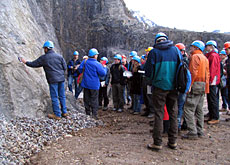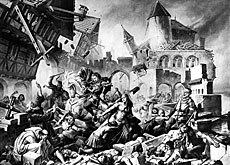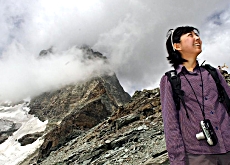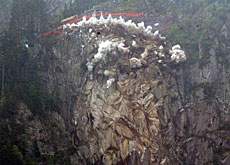Swiss unearth their geological secrets

Switzerland is famous for its mountains, but few Swiss know much about the beauties and the dangers that lie in the rocks beneath their feet.
In a series of events at the beginning of June entitled “Living Geology”, geologists all over Switzerland shared their knowledge and their passion with the public in lectures, exhibitions and excursions. Around 10,000 people took part.
“The mountains are regarded as a symbol of stability, but geologically speaking, nothing could be further from the truth,” Lionel Cavin, curator of an exhibition on natural disasters at the Geneva Museum of Natural History, told visitors.
Switzerland prides itself on its safety record, but everyone can recall recent geological incidents that have cost lives and had a serious economic impact.
Almost exactly a year ago falling rocks killed two motorists on the approach to the Gotthard tunnel, which then had to be shut for several weeks while geologists examined the site and organised a controlled explosion to remove the threat.
The instability of the ground was one of the major themes that cropped up again and again in the various Living Geology events.
Genevans were given a tour of the path leading between the Rhone and the cliffs of St Jean, a popular green area in the midst of the city, but where there is a constant danger of rockfalls.
A number of issues need to be considered, it was explained. Should the path be closed? If not, how should it be protected? And who bears responsibility in case of accidents?
Industrial pollution
Similar questions arise when it comes to clearing up the aftermath of old industrial pollution, which can cost huge amounts of money.
Geologists probing the ground under the old Bernese gasworks, or even the sites of the 19th century spinning and weaving mills of Canton Zurich, have found substances seeping through the soil which could threaten the purity of the local water supply.
In Canton Basel concerns have been raised about chemical residues from the pharmaceutical industry.
As the environment in general comes under pressure, geology has its role to play. New discoveries are constantly being made, raising new questions.
In particular, many geologists now doubt the received wisdom of our school textbooks about the number and the fluctuations of the ice ages.
Swiss cavers contributed to the debate when they found the remains of a young bear in a cave in Central Switzerland, as an exhibition in Ennetbürgen, in Canton Nidwalden, explained.
The find was dated to a time when the area was supposed to have been covered in ice, but bears need an abundant supply of plants, indicating that the climate was much warmer than traditionally thought.
Fluctuations
It seems likely that within very short periods of time the amount of ice fluctuated considerably. This has led to questions being raised about our understanding of current climate change.
It is difficult for human beings to grasp the time scale of geological events. Nor can people influence them. Geologists all over Switzerland are currently drawing up risk maps, so that suitable precautions can be taken and vulnerabilities eliminated where possible, but in the end Nature is often more powerful.
Martin Trüssel, of the Unterwalden Caving Society, summed it up as he conducted an excursion to one of the caves in the Bürgenstock, high above Lake Lucerne.
He pointed to a cleft in the rocks caused by an earthquake long ago: “We don’t know when the next one will come. What we do know is that it will come.”
swissinfo, Julia Slater
Around 10,000 people visited the events during the Living Geology weekend.
There was a choice of 158 events to visit.
It was organised by the Living Geology association, in association with Unesco Switzerland, the Swiss Geological Association, and the Swiss Academy of Sciences.
This was the first time such an event had been held, but it is intended to repeat it every three years.

In compliance with the JTI standards
More: SWI swissinfo.ch certified by the Journalism Trust Initiative



You can find an overview of ongoing debates with our journalists here . Please join us!
If you want to start a conversation about a topic raised in this article or want to report factual errors, email us at english@swissinfo.ch.